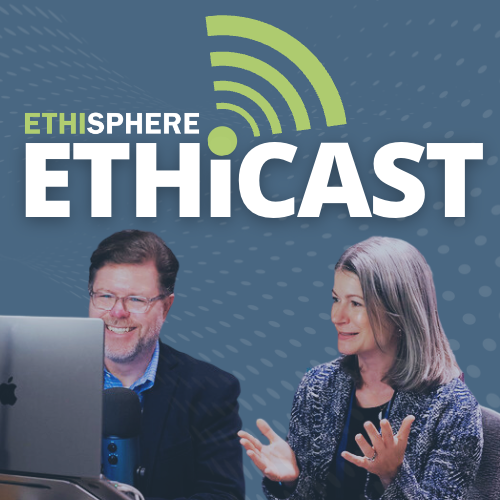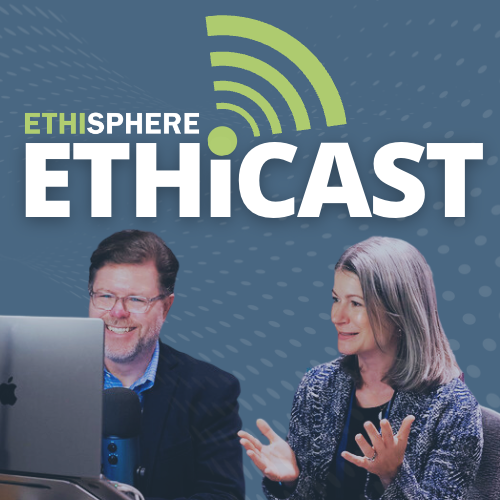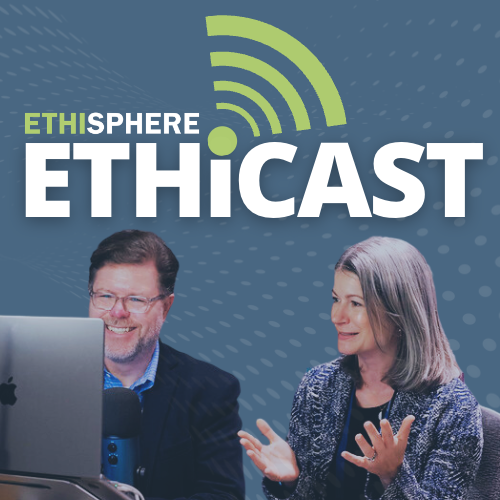[00:00:00] Speaker A: Hi everyone. Today we'll take a look at how two time World's Most Ethical Companies honoree Assurant approaches the complex issue of mergers and acquisitions due diligence. I'm your host Bill Coffin and this is the Ethicast.
Assurant is a premier global protection company that partners with the world's leading brands to safeguard and service connected devices, homes and automobiles. As a Fortune 500 company operating in 21 countries, it leverages data driven technology solutions to provide exceptional customer experiences. Assurant engages in numerous mergers and acquisitions and places a very high priority on practicing best in class M and A due diligence. In a world with swiftly tilting regulatory landscapes and pent up demand within the M and A space itself, the role that assurance, ethics and Compliance Team plays in safeguarding and optimizing the company's M and A strategy has never been more important. And for proof of how seriously Assurant's team takes that responsibility, look no further than the 2025 World's Most Ethical Companies Honoree roster where you'll find that Assurant has been recognized for a second year in a row. Joining us today to talk about this is Assurant Global Compliance Council Anna Grover. Anna joined Assurant as part of its $2.5 billion acquisition of the Warranty Group in 2018. Since then Assurant has closed a number of acquisitions including American Lease Insurance, EPG Insurance and Hila Mobile as well as other smaller transactions. In her role, Anna is a corporate Compliance liaison for the M and A team. Anna, thank you very much for joining us and congratulations to you and your team for your much deserved World's Most Ethical Companies recognition.
[00:01:47] Speaker B: Thanks so much Bill. It's great to be here with you and to talk about this very important topic.
[00:01:53] Speaker A: What is the role of ethics and compliance in an M and A transaction and how is it unique?
[00:01:58] Speaker B: Ethics and compliance is in a unique position in that it has a really broad remit and it can spot issues that may not be apparent. So we can add value on every deal. Since our day jobs involve liaising with stakeholders across the different lines of business and functions to get compliance programs implemented and generally provide support to the business and their operations. We like to look at risks holistically so we can be great connectors of issues, risks and risk owners. We have to make sure that specific topics are considered on an M and A transaction such as corruption, sanctions, helpline disclosures, et cetera. But there's also really a broader concept of reputational and compliance risk that can be quite Hard to quantify and spot. That's why it's important to have and involve ethics and compliance on every deal. We may not be the key participants in every situation. Not all deals are compliance driven, many are not. But we're very good at asking questions and assessing risk.
[00:03:02] Speaker A: Compliance often feels like its work isn't done until it finds a problem. But that might not always create value in an M and a transaction. Can you talk a little bit about that?
[00:03:11] Speaker B: Taking a risk based approach to due diligence is the key to success, both in terms of mitigating risk and in terms of being trusted advisors to the business and supporting the smooth flow of a transaction. So the overriding objective on a transaction for ethics and compliance is to advise the business on circumstances in the target company, its operations, its culture, its regulatory environment that could reasonably have an impact on our business's decision to pursue the deal, including potentially the pricing of the deal. So it's not necessarily whether we do it or not, whether it's legal or not, but whether the pricing is right, given the risks involved. To successfully do that, we take a risk based approach and use our years of experience to get a sense of where there may be potential issues so we can probe a little further. Some deals may inherently pose a higher risk due to the industry or the players involved and require more in depth review. But the final output is documented in a due diligence report. So that's kind of what we present at the end in conducting the diligence. To prepare that report, we have to go where the facts lead us and report on things as they are. Sometimes there are no compliance issues that we've been able to identify and the deal really is based more on price or operations or cultural fit. That's where having an experienced compliance colleague on the deal team becomes especially valuable. Many issues can be remediated after acquisition, so it's important to be able to include that in the risk assessment. Can we fix it and when and how. M and A deals tend to have really tight timeframes and so some of the considerations and informal risk assessments need to take place to determine whether to escalate either immediately or in the report and who the appropriate decision makers are. So there's a lot of nuance there there. How things are presented in the final due diligence report is also very significant.
We should present the facts and any relevant mitigation in a clear and actionable manner. What's the issue and its potential consequences? Can this be fixed? Like I mentioned, how, by whom and at what cost, so we avoid hypothesizing, especially in the report, because it can confuse busy decision makers. Accepting that a certain amount of risk is unavoidable in a transaction and viewing the due diligence with the goal of giving the business targeted and credible information to make decisions is very helpful. Again, an appropriate risk based approach is key to striking that right balance.
[00:05:56] Speaker A: You have mentioned the importance of being proactive when it comes to M and A due diligence. What do you mean by that and can you give an example?
[00:06:04] Speaker B: It's important for ethics and compliance to provide nuanced real world and timely advice to the business, so preparation is critical for the smooth progression of the deal. M and A deals tend to operate to tight time frames, so it makes sense to prepare as much as possible in advance and avoid surprises. So for example, you could consider common risks associated with your industry and the industries of your potential M and A targets. Based on those risks, you can create a library of due diligence questions that you can customize for each particular deal so that you don't have to create the lists from scratch or based on past deals that have may not have been very similar to this one. Include in that review the due diligence processes that may be needed, for example screening the target's vendors and clients or considering conflicts of interest between employees.
Another time saving idea is to create as many standardized templates as possible, such as the due diligence reports, so you can start populating the content throughout the due diligence process rather than relying on your memory or very voluminous notes at the end of what could be a months long process when it's crunch time to finalize the report. So in other words, you want to set up the infrastructure for your due diligence in advance because that will really free up your time to focus on the deal content and and adding value to the transaction and the transaction team.
[00:07:33] Speaker A: What are some of the ways that you build a strong relationship with the deal team and why is that relationship so important to your M and A due diligence work?
[00:07:43] Speaker B: That's a great question. Our ability to do our job successfully relies in large part on our ability to work effectively with the deal team and obtain the information that we need to draw our conclusions. This may sound corny, but being included on a deal team is a privilege. You get to dive into the needs of your business in a really concrete way and have an opportunity to make a difference to their strategy on how to achieve their needs and goals based on the risks you've identified. It's a unique partnership opportunity. At the same time, you get a chance to see under the hood of how another company functions and assess the risks and fit between the two companies. It's stressful for both deal teams and we want to make that process as smooth as possible for everyone. Personally, I wouldn't want anyone walking away thinking we hadn't paid enough attention or done our best to understand the genuine risks and opportunities of a transaction and how the target company operates and the values they bring.
One of the most important ways to effectively conduct diligence is to partner with other functions such as operations and HR to minimize the questions. We need to ask the due diligence questions and maximize the usage of the responses that were being provided. So as an example, customer complaints are an important topic for compliance, but it's also an important topic for the operations team. Same with hr. They're also interested in culture, employee morale and helpline statistics. So reviewing these teams due diligence questions, removing duplicates, proactively reaching out to identify potential risks together provides for a smoother experience for everybody involved. Reduces friction in what can already be quite a busy and stressful time. When people have confidence that you'll only ask questions when that information is needed, they're more likely to go the extra mile to obtain it for you. M and A is a fundamental element of doing business, and the M and A market has continued to stay active and strong. So for ethics and compliance professionals listening to this podcast, there are three things that you should remember as you approach your role on mergers and acquisitions. 1. Ethics and compliance plays a key role and can add value on any deal by reducing risks and locking profitable and compliant growth for many companies.
2. We ask really important, good questions, very insightful questions, and three we can help ensure a smooth transaction by leveraging templates in our relationships with other functions and business areas. It's a really great opportunity to make a difference to our company.
[00:10:30] Speaker A: Anna, thank you so much for joining us to discuss the work that you and your team are doing. And congratulations once again to you and all of your colleagues at Assurant for earning your second World's Most Ethical Company's recognition.
[00:10:41] Speaker B: Thanks so much for having me. All the best.
[00:10:44] Speaker A: To learn more about Assurant, including its corporate citizenship, latest insights and more, visit assurant.com and to see Assurant's spot among its fellow World's Most Ethical Companies Honorees, visit worldsmostethicalcompanies.com to appear as a guest on the Ethicast. Drop us a
[email protected] ethicast to share a best practice ENC success story or proof point around how business integrity builds value. Thanks for joining us. We hope you've enjoyed the show. For new episodes each week, be sure to subscribe on YouTube, Apple Podcasts and Spotify. And until next time, remember, strong ethics is good business.


